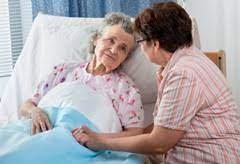
This is an aricle of interest from Daily Caring.
Hospital trips happen suddenly
Sudden hospital trips with your older adult are incredibly stressful and completely outside of your control. But there is one thing you can control — your caregiver essentials hospital kit.
Just like a natural disaster kit, this is something you assemble ahead of time…just in case. Put important documents, key information, and a few necessities into a tote bag. Creating this kit ahead of time prepares you for any emergency. Stash your bag where you spend a lot of time.
If there’s a crisis, grab your caregiver essentials kit, get to the hospital, and feel confident that you have what you need to take care of your older adult and yourself.
What to bring for your older adult
Key paperwork (copies only)
Insurance card
ID or driver’s license (keep a copy in the bag, but bring the original too)
Living will, advance directive, healthcare proxy, or medical power of attorney
Durable power of attorney
POLST
Personal information
Current height and weight – get this from a recent doctor visit
Current list of medications – include full Rx name, dosage, and schedule
Notes about allergies and medications that have caused negative reactions
Brief medical history – a short list of surgeries, hospitalizations, and current health issues (include dates when possible)
Don’t count on hospitals having information on hand
Having all this key info about your senior in your hands means you won’t have to scramble when hospital staff asks questions.
You might think the hospital would have your older adult’s information on file if they’ve been there before, but we’ve found that this isn’t always the case. It’s best to be prepared so the staff gets the correct information entered into their system.
What to bring for yourself
Most likely, you’ll be spending at least a few hours at the hospital. In some cases, you might need to stay overnight before you have a chance to go home and get some things for yourself.
Hospitals are notorious for taking ages to complete tests or have a doctor to talk with you. Having some necessities on hand will help you feel more calm, comfortable, and in control of the situation.
Here are our top suggestions:
List of important phone numbers – if they’re not already in your cell phone
Comfortable clothes and shoes
Reading glasses – inexpensive pair from the drugstore or these from ThinOptics
Phone charger
Pen and notepad to jot notes, questions, phone numbers, and names
Book, puzzles, music player for entertainment
Gum, mints, or packaged snacks so you’re not completely at the mercy of the vending machine selection
Ear plugs or eye mask – in case you need to sleep over
Small bills and change for vending machines
By DailyCaring Editorial Staff
Photo : Harvard Health (Google image)



